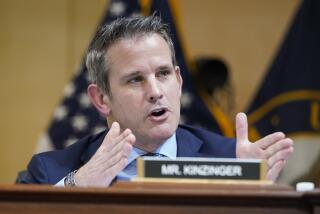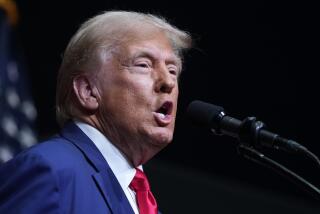Man of (unpopular) principle
- Share via
CONCORD, N.H. — Republican John McCain returned Friday to the state that vaulted him to national prominence and, in trying to reinvigorate his flagging presidential campaign, he won his biggest applause condemning the “broken system” in Washington.
But that echo of the reform rhetoric that drove his stunning win in New Hampshire’s 2000 GOP primary was just a quick detour from the Arizona senator’s sober topic of the day: the Iraq war.
In Baghdad, there seems to be “movement in the right direction,” he told a business luncheon crowd. And however unpopular the war may be to growing numbers of Americans, McCain said, principle -- not polls -- must drive the nation’s leaders in charting the U.S. course in Iraq.
McCain was respectfully received. But the reception sparked no reminders of the enthusiastic welcomes he often got in 2000. And the contrast underscored the political hurdle he now confronts: Voters may still admire him, but they don’t agree with him on key issues.
New Hampshire rewarded McCain when he crusaded for the popular principle of fighting big-money campaign donors. But in his 2008 run, he is stressing principles that put him sharply at odds with many of the state’s core Republicans -- who disagree with his push to overhaul immigration law -- and its crucial independents, who break with him on Iraq.
“Those are things that cut a lot more deeply with voters than campaign finance ever did,” said Dante J. Scala, a political scientist at the University of New Hampshire. “So that’s really going to put McCain’s man-of-principle attraction to the acid test.”
Reeling from campaign staff cuts, money problems and a continuing drop in the polls, McCain is depending more than ever on New Hampshire’s first-in-the-nation primary to revive his White House prospects.
It is one of just three states -- Iowa and South Carolina are the others -- where he is concentrating his efforts after his campaign spent nearly all of the $25 million that he raised in the first half of this year.
But the landscape in New Hampshire could hardly be worse for McCain. It was the overwhelming support of independents that fueled his victory seven years ago -- state law allows them to vote in the party primary of their choice. But now, many independents sharply disagree with his support of President Bush’s troop buildup in Iraq.
“He’s dead wrong,” independent voter Raymond Longa, an engineering technician, said after a haircut this week at the All American barbershop in Derry.
Largely because of Bush’s conduct of the Iraq war, Republicans lost both of New Hampshire’s congressional seats and both chambers of its Legislature in November, part of a Democratic tide that swept New England and much of the nation.
Other Republicans running for president -- notably former New York Mayor Rudolph W. Giuliani and ex-Massachusetts Gov. Mitt Romney -- avoid the subject of Iraq unless asked about it.
McCain, however, has gone out of his way to call attention to his support for the war, as he did in his speech here Friday.
“Democratic candidates for president will argue for the course of cutting our losses and withdrawing from the threat in the vain hope it will not follow us here,” McCain said. “I cannot join them in such wishful and very dangerous thinking.”
To close observers of New Hampshire politics, McCain’s emphasis on Iraq makes little sense, at least from the standpoint of campaign strategy.
“George Bush has John McCain in the front seat of his pickup truck as he’s heading off the cliff, and John McCain is saying, ‘Yeah, keep going, baby, step on the gas,’ ” said Dick Bennett, president of New Hampshire-based American Research Group, a nonpartisan polling company.
Bush’s poll numbers in the state are more dismal than they are nationwide. A survey by Bennett’s company last month found 78% of New Hampshire voters disapproved of the president’s job performance. Among independents, 81% gave Bush negative job ratings, and among Republicans the figure was 58%, suggesting GOP candidates have strong incentive to keep their distance from him.
Yet McCain’s Friday speech put him firmly behind Bush on the war, even if -- in response to a question -- he called its early stages “very badly mismanaged.”
“McCain is doing what he thinks is in the best interest of his country,” said Mark Salter, a senior advisor and coauthor of several books with the senator. “That’s what he does every day of his career.”
McCain’s speech drew polite applause at the Concord Chamber of Commerce luncheon. Afterward, he told reporters that his support for the war was “not helpful with independents,” and his stand on immigration “was obviously not helpful with the Republican base.” But he tried to project optimism.
“The immigration issue is largely resolved,” he said, alluding to the collapse of overhaul legislation in the Senate last month. “It’s not going to be on the front burner.”
Still, it is not forgotten. Mike Lecuyer, 58, a Republican interviewed outside a Derry pizzeria, said he would have considered McCain, but he ruled him out because of support for putting illegal immigrants on a path to citizenship.
“He’s taken himself out of it with the immigration,” said Lecuyer, who works at an engineering firm. “They need to enforce the laws that are already in place.”
McCain also faced questions Friday on how he could survive the race when his campaign had spent almost all of its money six months before the voting starts -- an awkward turn for a man who pledges fiscal discipline.
“We’ll win the same way we almost won [the GOP presidential nomination] in 2000,” said McCain, who has slashed scores of workers from his campaign payroll and cut the salaries of others. “We’re going to do the town hall meetings.... We’re going to have the direct contact with the people.”
Dan Schnur, the McCain campaign’s communications director in 2000, said: “If there’s a silver lining in all of this, the budget and staffing problems may help him rediscover himself as a candidate.”
He suggested that McCain visit “the tiniest high school gym in the smallest town he visited in 1999, and when he gets there, he stands up and says, ‘I’m back where I started, and I’m starting over.’ ”
Still, the question looms of what happens when a candidate who runs as a man-of-principle sticks to convictions that hold scant appeal to voters.
At a laundry in Derry, retired fuel dealer Lawrence Riemer, an independent, agreed that McCain speaks his mind. But he said he could not support him, mainly because of his stand on the war.
“I believe that he believes what he’s saying is the right way to go,” Riemer said. “But I don’t.”
More to Read
Get the L.A. Times Politics newsletter
Deeply reported insights into legislation, politics and policy from Sacramento, Washington and beyond. In your inbox twice per week.
You may occasionally receive promotional content from the Los Angeles Times.









